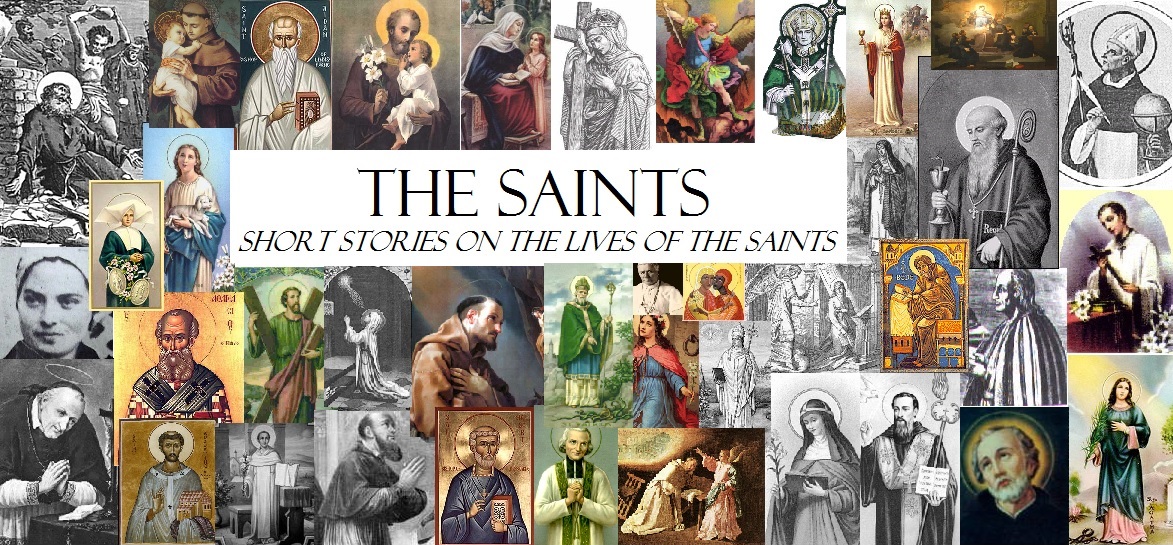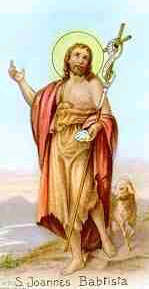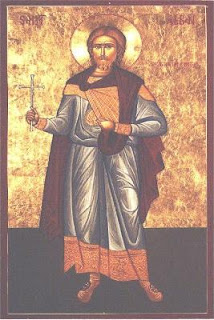The Martyrdom of St. Paul - June 30th
St. Paul is the great Apostle who first persecuted the Christians and then was converted. At the time of his conversion, Jesus had said: I will show him how much he must suffer for Me.”
St. Paul loved Jesus Crucified very much-so much that he became living copy of Our Divine Savior. All his life, during his many missionary trips, St. Paul met troubles and went through dangers of every kind. He was whipped, stoned, shipwrecked, and lost at sea. Many, many times, he was hungry, thirsty, and cold.
Yet, he always trusted in God. He never stopped preaching. “The love of Jesus presses me onward,” he said. In reward, God gave him great comfort and in every suffering.
When St. Paul found out that the Emperor Nero had begun a terrible persecution in Rome, he hurried back to Rome to comfort and encourage the Christians. The thought of the danger did not stop him. Before long, however, he and St. Peter were also put in prison and condemned. They were led out to execution together. As they walked along, these two great heroes of Christ encouraged each other.
At a certain point they were separated. St. Peter was crucified on Vatican Hill, and St. Paul was taken and beheaded near the place where his Basilica now stands. With what faith St. Paul bowed his head to accept the blow! From prison he had written: “Behold, the time of my deliverance is at hand. I have fought the good fight. I have kept the Faith. And there is laid up for me a crown, which the Lord will give me and to all those who love and serve Him.”
When we have some trouble or little cross, let us think of St. Paul, and let us pray to him for patience and more love of God.

Search This Blog
6/30/08
6/29/08
St. Peter
St. Peter - June 29th
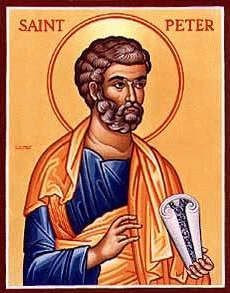
Peter, the first Pope and the prince of the Apostles, was a fisherman when Jesus invited him to follow Him, saying: “I will make you a fisher of men.” Peter was a simple man who sometimes acted without thinking, but he was generous, honest and very much attached to Our Lord.
This great Apostle’s name was Simon, but Jesus Himself changed it to Peter, which means “rock.” “You are Peter,” Jesus said, “and on this rock I shall build my Church.”
Because he did not pray for strength, he became afraid when Our Lord was arrested. It was then that he committed the sin of denying Our Lord three times, but he repented, and wept over his sin the rest of his life. Jesus forgave Peter and, after His Resurrection, asked him three times: “Do you love Me? Poor Peter! “Lord,” he said, “You know all things. You know I love You.” Then Our Lord said: “Feed My lambs and My Sheep.” He was telling Peter to rule over the whole Church, and after Our Lord went back to Heaven, Peter was the leader of all the Christians.
He went to Rome to live and converted many pagans. When a great persecution began, the Christians begged St. Peter to leave Rome and save himself. He started out, but on the road, he met Our Lord coming in. “Lord, where are you going?” Peter asked. And Jesus answered, “I am coming to be crucified a second time.” Then St. Peter turned around and went back, for he knew that the vision meant he was the one who was to die on the cross. He was taken prisoner and condemned to death by crucifixion. St. Peter asked to be crucified with his head downward, because he said he was not worthy to suffer as Jesus had.
If we have fallen into sin, we should not get discouraged. We should imitate St. Peter by being sorry and loving Jesus more than ever before.
6/28/08
St. Irenaeus - Patron of Gaul
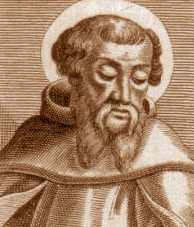
St. Irenaeus - Patron of Gaul - June 28th
Irenaeus was a Greek who was born less than a hundred years after Our Lord died. He had the great privilege of being taught by St. Polycrap, who had been a disciple of St. John the Apostle. Irenaeus once told a friend: “I listened to St. Polycrap’s instructions very carefully, and I wrote down his actions and his words-not on paper, but on my heart.”
After he became a priest, Irenaeus was sent to the French city of Lyons. It was in this city that the Bishop, St. Pothinus, was martyred with a great many other Saints. Irenaeus missed being martyred because he was asked by his brother priests to take an important message from them to the Pope in Rome. In that letter they spoke of Irenaeus as a man full of zeal for the Faith.
When Irenaeus returned to be the Bishop of Lyons, the persecution was over. But there was another danger: a heresy called Gnosticism. The false religion attracted some people by its promise to teach them secret mysteries. Irenaeus studied all its teachings and then in five books showed how wrong they were. He wrote with politeness, because he wanted to win people for Jesus, but sometimes his words were strong, such as when he said: “As soon as a man has been won over by the Gnostics, he becomes puffed up with conceit, and self-importance, and with majestic air of a cock, he goes strutting about.” St. Irenaeus’ books were read by so many people that before too long, the whole heresy began to die out.
St. Irenaeus always remembered what he had been taught by St. Polycrap. We, too, should try to forget whatever evil impressed us, and think, instead, about the good things we have heard or read. If we think well, we will live well.
6/27/08
Blessed Madeleine Fontaine and Her Three Companions
Blessed Madeleine Fontaine and Her Three Companions - June 27th
These four French martyrs were Sisters of Charity of St. Vincent de Paul. Besides Blessed Madeleine, there were Blessed Frances Lanel, Blessed Teresa Fantou, and Blessed Joan Gerard. They were put to death for their Faith in the bloodiest days of the French Revolution.
First, the four Sisters were arrested because they refused to take an oath that could not be taken without committing a sin. The enemies of the church said that they had found certain papers in the convent which showed that the Sisters had been working against the Revolution. None of this was true, but a wicked judge in the city of Cambrai had Blessed Madeleine, the Superior, condemned to death, together with her three Sisters.
The sisters walked to their execution calmly singing a hymn to the Blessed Mother, “Hail, Star of the Sea.” Sister Madeleine was the last to die. As she came near the guillotine, she cried to the watching crowd: “Listen, Christians! We are the last victims. The persecution is going to stop. The altars of Jesus will rise again in glory!”
Her prophecy came true. The evil man who had judged the martyrs had to stop the executions because people were so angry with him. Six weeks later, he himself was beheaded.
No matter what happens, we should never promise to do something which is forbidden by God’s law.
These four French martyrs were Sisters of Charity of St. Vincent de Paul. Besides Blessed Madeleine, there were Blessed Frances Lanel, Blessed Teresa Fantou, and Blessed Joan Gerard. They were put to death for their Faith in the bloodiest days of the French Revolution.
First, the four Sisters were arrested because they refused to take an oath that could not be taken without committing a sin. The enemies of the church said that they had found certain papers in the convent which showed that the Sisters had been working against the Revolution. None of this was true, but a wicked judge in the city of Cambrai had Blessed Madeleine, the Superior, condemned to death, together with her three Sisters.
The sisters walked to their execution calmly singing a hymn to the Blessed Mother, “Hail, Star of the Sea.” Sister Madeleine was the last to die. As she came near the guillotine, she cried to the watching crowd: “Listen, Christians! We are the last victims. The persecution is going to stop. The altars of Jesus will rise again in glory!”
Her prophecy came true. The evil man who had judged the martyrs had to stop the executions because people were so angry with him. Six weeks later, he himself was beheaded.
No matter what happens, we should never promise to do something which is forbidden by God’s law.
6/26/08
St. Pelagius
St. Pelagius - June 26th
This boy martyr of Spain lived in the days when the Moors ruled part of his homeland and were fighting the Spanish Christians. Pelagius was only ten when his uncle had to leave him as a hostage with the Moors in the city of Cordova. He would not be allowed to go free until his uncle sent what the Moors demanded.
Three years passed and still the young Christian remained a prisoner. By this time, he was a handsome, lively boy of thirteen, and although many of the other prisoners were men of evil habits, Pelagius was not led to sin by their example. For one so young, he had a strong will and knew how to keep himself good-even in a prison.
The ruler of the Moors heard about the handsome young prisoner and he sent for him. He liked what he saw, and he offered Pelagius his freedom, plus fine clothes to wear, beautiful horses to ride, honor, money-as long as he would give up his Faith and become a Mohammedan like his captors.
“All those things you named mean nothing to me,” answered the boy firmly. “I have been a Christian. I am a Christian now. I shall continue to be a Christian.” Then the ruler tried threatening Pelagius, but neither his promises nor his threats had any effect.
What courage and generosity in this young boy of thirteen! He died a martyr for his Faith. Let us ask ourselves how faithful we are at least to the few little practices of piety our Religion requires of us.
This boy martyr of Spain lived in the days when the Moors ruled part of his homeland and were fighting the Spanish Christians. Pelagius was only ten when his uncle had to leave him as a hostage with the Moors in the city of Cordova. He would not be allowed to go free until his uncle sent what the Moors demanded.
Three years passed and still the young Christian remained a prisoner. By this time, he was a handsome, lively boy of thirteen, and although many of the other prisoners were men of evil habits, Pelagius was not led to sin by their example. For one so young, he had a strong will and knew how to keep himself good-even in a prison.
The ruler of the Moors heard about the handsome young prisoner and he sent for him. He liked what he saw, and he offered Pelagius his freedom, plus fine clothes to wear, beautiful horses to ride, honor, money-as long as he would give up his Faith and become a Mohammedan like his captors.
“All those things you named mean nothing to me,” answered the boy firmly. “I have been a Christian. I am a Christian now. I shall continue to be a Christian.” Then the ruler tried threatening Pelagius, but neither his promises nor his threats had any effect.
What courage and generosity in this young boy of thirteen! He died a martyr for his Faith. Let us ask ourselves how faithful we are at least to the few little practices of piety our Religion requires of us.
6/25/08
St. William of Monte Vergine
St. William of Monte Vergine - June 25th
William was born in Northern Italy and was brought up by relatives because his parents died when he was a baby. When William grew up, he became a hermit, but when he worked a miracle and cured a blind man, he became famous. He was too humble to be pleased with the people’s admiration, so he went away to live alone on a very high, wild mountain.
Even there, however, men gathered around the Saint and he built a monastery for them dedicated to the Blessed Virgin. People gave the mountain a new name now-the Mountain of the Virgin-because of William’s monastery.
Later the Saint founded other great monasteries, helped by King Roger of Naples. His good influence on this king angered some evil men of the court, and they tried to show William was really an evil man hiding behind a holy habit. They sent a bad women to tempt him to sin. As soon as William what kind of women this visitor was, he worked a miracle and the evil women ran away frightened.
When we are tempted to commit a sin of impurity, we should remember that after that sin we might die and go to hell to suffer forever.
William was born in Northern Italy and was brought up by relatives because his parents died when he was a baby. When William grew up, he became a hermit, but when he worked a miracle and cured a blind man, he became famous. He was too humble to be pleased with the people’s admiration, so he went away to live alone on a very high, wild mountain.
Even there, however, men gathered around the Saint and he built a monastery for them dedicated to the Blessed Virgin. People gave the mountain a new name now-the Mountain of the Virgin-because of William’s monastery.
Later the Saint founded other great monasteries, helped by King Roger of Naples. His good influence on this king angered some evil men of the court, and they tried to show William was really an evil man hiding behind a holy habit. They sent a bad women to tempt him to sin. As soon as William what kind of women this visitor was, he worked a miracle and the evil women ran away frightened.
When we are tempted to commit a sin of impurity, we should remember that after that sin we might die and go to hell to suffer forever.
6/24/08
St. John the Baptist
St. John the Baptist - June 24th
John’s parents were Zachary and Elizabeth. Elizabeth was a cousin of Mary, the Mother of Jesus. Mary went to visit and help when Elizabeth was old and about to become the mother. When they met, Jesus Who was within Mary, sanctified John, who was not yet born.
At the birth of St. John, his father gave him the name John, as the angel had commanded. John’s mission was to prepare the way for the coming of Jesus. So when he was still a young boy he went into the desert to prepare himself with silence, prayer and penance. Soon crowds started to come to him. He warned them to be sorry for their sins, and to change their lives, he gave them the baptism of repentance. One day, Our Lord Himself came. He wanted to be baptized by St. John to begin making reparation for our sins. On that day, John said to his disciples that Jesus was the Messias for whom they had been waiting. He told them and everyone else to follow Him.
Later on, St. John learned that King Herod had married a woman who already had a husband and a daughter. This king was the son of the King Herod who murdered all those little boys in Bethlehem. St. john told him that it was wrong of him to live with that woman. For this, he was put in prison. He remained a prisoner until Herod had his head cut off to please the daughter of his sinful wife.
St. John’s motto was, “Jesus must become more and more, and I must become less and less.”
We must remember that God is everything and we are nothing. Let us learn from St. John not to look for praise and admiration, but to do everything for the glory of God.
6/23/08
St. Audrey (or Etheldreda)
St. Audrey (or Etheldreda) - June 23rd
St. Audrey was born in England. Her three sisters are also saints. She wanted to be a bride of Christ, but her parents wanted her to marry. Although she gave in to their wishes, she and her husband lived together as brother and sister. Three years later, he died, and Audrey went to live a quiet life of prayer on the island he had given her.
After five years, the saint’s relatives demanded that she marry again, and once more, Audrey gave in. Her second husband was young, and they, too, lived as brother and sister. Audrey spent all her time doing works of mercy. However, when her husband became older and was a powerful king, he wanted her to live as a wife and a queen. She replied that she belonged only to God. He tired hard to make her change her mind, but in the end, he let her become a nun.
Back on her own island, St. Audrey founded a convent and was a very holy superior. Instead of wearing the linen clothes worn by other noble women, she chose rough wool robes for herself. She slept only a few hours and prayed the rest of the night. St. Audrey died at the exact time she said she would, and her body was put into a plain wooden coffin, as she had wanted.
Let us admire this Saint who could have enjoyed all the pleasures of the world and instead gave them all up to make sure she would gain the pleasures of Heaven.
St. Audrey was born in England. Her three sisters are also saints. She wanted to be a bride of Christ, but her parents wanted her to marry. Although she gave in to their wishes, she and her husband lived together as brother and sister. Three years later, he died, and Audrey went to live a quiet life of prayer on the island he had given her.
After five years, the saint’s relatives demanded that she marry again, and once more, Audrey gave in. Her second husband was young, and they, too, lived as brother and sister. Audrey spent all her time doing works of mercy. However, when her husband became older and was a powerful king, he wanted her to live as a wife and a queen. She replied that she belonged only to God. He tired hard to make her change her mind, but in the end, he let her become a nun.
Back on her own island, St. Audrey founded a convent and was a very holy superior. Instead of wearing the linen clothes worn by other noble women, she chose rough wool robes for herself. She slept only a few hours and prayed the rest of the night. St. Audrey died at the exact time she said she would, and her body was put into a plain wooden coffin, as she had wanted.
Let us admire this Saint who could have enjoyed all the pleasures of the world and instead gave them all up to make sure she would gain the pleasures of Heaven.
6/22/08
St. Alban
St. Alban - June 22nd
St. Alban was the first martyr of England, his own country. During a persecution of Christians, Alban, though a pagan then, hid a priest in his house. The priest made such a great impression on this kind pagan that Alban received instructions and became a Christian himself.
In the meantime, the governor had been told that the priest was hiding in Alban’s house, and he sent his soldiers to capture him. But Alban changed Clothes with his guest, and gave himself up in his stead. The judge was furious when he found out that the priest had escaped and he said to Alban, “You shall get the punishment he was to get unless you worship the gods.” The Saint answered that he would never worship those false gods again. “To what family do you belong?” demanded the judge. “That does not concern you,” said Alban. “If you want to know my religion, I am a Christian.” Angrily the judge commanded him again to sacrifice to the gods at once. “Your sacrifices are offered to devils,” answered the Saint. “They cannot help you or answer your requests. The reward for such sacrifices is the everlasting punishment of Hell.”
Since he was getting nowhere, the judge had Alban whipped. Then he commanded him to be beheaded. On the way to the place of execution, the soldier who was to kill the Saint was converted himself, an he, too, became a martyr.
Jesus taught us, “Love one another, as I have loved you.” We love our neighbor when, like Jesus and the Saints, we make sacrifices for others.
6/21/08
St. Aloysius Gonzaga
St. Aloysius Gonzaga - Patron of Youth - June 21st
Aloysius, the Patron of Catholic youth, was the oldest son of an Italian marquis. Since he was so full of life, his father planned to make a great soldier out of him, and when he was only five, he took him to an army camp. There little Aloysius marched in parade and even managed to load and fire a gun one day while the camp was at rest! He learned rough language, too, from the soldiers, but when he found out that this talk was shameful, he felt very bad.
As he grew, Aloysius was sent to the courts of dukes and princes. Many sins of dishonesty, hatred, and impurity were being committed in this high society. But the only effect it all had on the Saint was to make him more careful to protect his purity. He fell sick and that gave him a good excuse to stay in his room to pray and read the lives of the saints.
When Aloysius was sixteen, he resolved to leave the world and become a Jesuit, but his father refused his consent. However, after three years, he finally gave in. Once he had entered, Aloysius begged to serve in the kitchen and to wash dishes, because he wanted to practice humility. He would say, "I am a crooked piece of iron and am come into religion to made straight by the hammer of mortification and penance.”
When a terrible disease broke out in Rome, Aloysius asked to be allowed to care for the sick. He who had always had servants to wait on him gladly washed the sick and made their beds. He served them until he caught the sickness himself.
St. Aloysius was only twenty-four when he died. His last words were, “I am going to Heaven.”
The virtue which is outstanding in St. Aloysius is purity. To keep pure we should do what he did, that is, mortify all our senses, and especially our eyes.
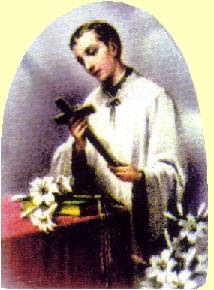
Aloysius, the Patron of Catholic youth, was the oldest son of an Italian marquis. Since he was so full of life, his father planned to make a great soldier out of him, and when he was only five, he took him to an army camp. There little Aloysius marched in parade and even managed to load and fire a gun one day while the camp was at rest! He learned rough language, too, from the soldiers, but when he found out that this talk was shameful, he felt very bad.
As he grew, Aloysius was sent to the courts of dukes and princes. Many sins of dishonesty, hatred, and impurity were being committed in this high society. But the only effect it all had on the Saint was to make him more careful to protect his purity. He fell sick and that gave him a good excuse to stay in his room to pray and read the lives of the saints.
When Aloysius was sixteen, he resolved to leave the world and become a Jesuit, but his father refused his consent. However, after three years, he finally gave in. Once he had entered, Aloysius begged to serve in the kitchen and to wash dishes, because he wanted to practice humility. He would say, "I am a crooked piece of iron and am come into religion to made straight by the hammer of mortification and penance.”
When a terrible disease broke out in Rome, Aloysius asked to be allowed to care for the sick. He who had always had servants to wait on him gladly washed the sick and made their beds. He served them until he caught the sickness himself.
St. Aloysius was only twenty-four when he died. His last words were, “I am going to Heaven.”
The virtue which is outstanding in St. Aloysius is purity. To keep pure we should do what he did, that is, mortify all our senses, and especially our eyes.

6/20/08
Blessed Osanna of Mantua
Blessed Osanna of Mantua - June 20th
This Italian Saint was the oldest child of a large family. Her father had wanted her to marry, but Osanna gave herself entirely to God.
When she was eighteen, Osanna received a wedding ring from Our Lord. Though no one else could see it, she always felt it on her finger. She also felt some of the sufferings Jesus suffered-the crown of thorns, the wound in His side, and the wounds in His hands and feet. She lived at home and served her family in every way, yet she belonged to the third order of St. Dominic and wore the habit of that order.
Strange as it may seem, Osanna was asked by the Duke of Mantua to run the affairs of his kingdom while he was away. She who had never been to school knew how to make the best decisions because she trusted completely in God. And she used her friendship with the Duke to help everyone in any kind of trouble.
A great many of Blessed Osanna prayers were for the church and for Italy. She feared God would send great punishments for the many sins being committed in her time. Yet she was not a gloomy soul. She loved her friends dearly, and people crowded her house to ask her advice and comfort.
A person living in the world can become a saint, if he prays, keeps away from sin and does good deeds. To learn how to live such a holy life, we should read inspiring books.
This Italian Saint was the oldest child of a large family. Her father had wanted her to marry, but Osanna gave herself entirely to God.
When she was eighteen, Osanna received a wedding ring from Our Lord. Though no one else could see it, she always felt it on her finger. She also felt some of the sufferings Jesus suffered-the crown of thorns, the wound in His side, and the wounds in His hands and feet. She lived at home and served her family in every way, yet she belonged to the third order of St. Dominic and wore the habit of that order.
Strange as it may seem, Osanna was asked by the Duke of Mantua to run the affairs of his kingdom while he was away. She who had never been to school knew how to make the best decisions because she trusted completely in God. And she used her friendship with the Duke to help everyone in any kind of trouble.
A great many of Blessed Osanna prayers were for the church and for Italy. She feared God would send great punishments for the many sins being committed in her time. Yet she was not a gloomy soul. She loved her friends dearly, and people crowded her house to ask her advice and comfort.
A person living in the world can become a saint, if he prays, keeps away from sin and does good deeds. To learn how to live such a holy life, we should read inspiring books.
6/19/08
St. Juliana Falconieri
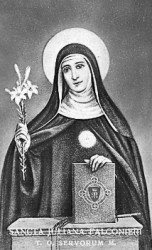
St. Juliana Falconieri - June 19th
Juliana was the only daughter of a very rich Italian couple. She came in answer to their prayers when they were already growing old. After her father died, her uncle, St. Alexis, helped for mother with her education. St. Alexis was one of the Founders of the Servite Order, the Servant of Mary. Juliana had such a devotion to Our Lady that she decided to become a Servite nun. She and other devout women spent their time in prayer and works of mercy. St. Juliana is considered the Foundress of the Nuns of the Servite Order because she wrote their rule of life.
Never did the Saint lose a chance to help someone. She especially worked to make peace between enemies and to win sinners back to Jesus. Though sick herself, she loved to take care of the sick and to make their sufferings easier to bear. In her own sufferings she was always cheerful. St. Juliana’s great love was Jesus in the Holy Eucharist. Her heart was broken when she could not receive Holy Communion because of the stomach disease that led to her death. But Jesus worked an amazing miracle to reward her devotion. As she lay dying, she asked the priest to lay a Host on a linen over her heart. He did and at that moment she died. The Sacred Host disappeared at the same time, and an image of Jesus on the Cross was found on her skin at the spot where the Blessed Sacrament had disappeared.
St. Juliana wanted to receive Jesus in Holy Communion, even when she could not. And we? Do we go to receive Our Lord in Holy Communion as often as possible?
6/18/08
St. Ephrem
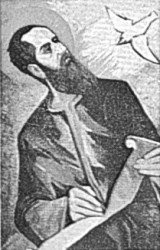
St. Ephrem - June 18th
Ephrem was born in Mesopotamia. He was not baptized until he was eighteen, but right afterwards he could think of nothing but leading a holy life. The thought of appearing before God after death to be judged made him tremble and he wanted to prepare for that judgment by living well. He was naturally quick to become angry, but he gained such a control over himself that people thought of him as a very calm man.
Ephrem became a hermit in a cave near the city of Edessa in Syria. His clothes were just patched rags and he ate only enough to keep alive. His chief work all this time was the writing of spiritual books. So holy and beautiful are these books that St. Ephrem is given the title of “Doctor of the Church.”
He often went to preach in Edessa, and people cried when he spoke about God’s judgment. Because he thought he was a great sinner, he wept all his life for the slight sins he had committed as a child. When St. Bazil met him and asked if he were Ephrem, the famous servant of Jesus, St. Ephrem said, “I am Ephrem who walks unworthily on the way of salvation.” Then he asked and received from St. Bazil much advice on how to live his spiritual life in the best way possible.
St. Ehprem is also called the “Harp of the Holy Ghost,” Because he wrote many beautiful hymns. These hymns were very popular and as people sang them, they learned much about the Faith. In this way, too, Ephrem saved them from falling into heresy.
So humble was this Saint that in his last sickness, he said to his friends: “When I die, treat my body without any respect, in order to show what I am.”
We, too, will be judged after our death. But if we think of our judgment now, we will prepare for it with a good life.
6/17/08
Sts. Teresa and Sanchia
Sts. Teresa and Sanchia - June 17th
These two sisters were daughters of the King of Portugal. Teresa was the older one. She married King Alfonso IX of Spain and became the mother of several children. But this marriage was not valid and it was wrong for Teresa to stay as his wife. Because she loved the king dearly, it was very hard for her to leave him. Yet, she did not want to disobey God’s law, and finally she went back to Portugal.
On her own land, Teresa built a large convent for Cistercian nuns. She herself shared their life fully, even though she did not stay there all the time, for she had to take care of her other property.
Her sister, St. Sanchia, never married. She, too, founded a convent on her land and devoted herself to good works. When she visited her beloved sister, Teresa, and saw what holy life the Cistercian nuns led, she changed her convent into a convent of the Cistercian Order and joined it herself. After Sanchia’s death, St. Teresa took her body back to her own convent. Then, when she had settled quarrels between her children and the Kind of Alfonso’s second wife, she took the veil of a nun in her convent. For almost twenty years, she lived as a very fervent sister. When she died, she was buried beside St. Sanchia.
If we ever make a promise to do something wrong, let us make sure we do not keep it. We cannot offend God to please someone else.
These two sisters were daughters of the King of Portugal. Teresa was the older one. She married King Alfonso IX of Spain and became the mother of several children. But this marriage was not valid and it was wrong for Teresa to stay as his wife. Because she loved the king dearly, it was very hard for her to leave him. Yet, she did not want to disobey God’s law, and finally she went back to Portugal.
On her own land, Teresa built a large convent for Cistercian nuns. She herself shared their life fully, even though she did not stay there all the time, for she had to take care of her other property.
Her sister, St. Sanchia, never married. She, too, founded a convent on her land and devoted herself to good works. When she visited her beloved sister, Teresa, and saw what holy life the Cistercian nuns led, she changed her convent into a convent of the Cistercian Order and joined it herself. After Sanchia’s death, St. Teresa took her body back to her own convent. Then, when she had settled quarrels between her children and the Kind of Alfonso’s second wife, she took the veil of a nun in her convent. For almost twenty years, she lived as a very fervent sister. When she died, she was buried beside St. Sanchia.
If we ever make a promise to do something wrong, let us make sure we do not keep it. We cannot offend God to please someone else.
6/16/08
St. John Francis Regis
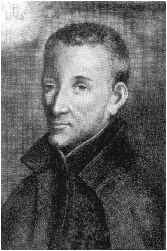
St. John Francis Regis - June 16th
When he was eighteen, this French Saint entered the Jesuit Order. In the seminary, his love for God and for souls showed in the way he prayed and in his eagerness to teach catechism in the parishes when he could. After he was ordained a priest, St. John Francis began his work as a missionary preacher. He gave very simple talks that came right from his heart. He especially spoke to the poor, ordinary folks, and they came in great crowds to hear him. He spent his mornings praying, hearing confessions, and preaching. In the afternoon, he would visit prisons and hosptials. To someone who said that the prisoners and bad women he converted would not stay good for long, the Saint answered: “If my efforts stop just one sin from being committed, I shall consider them worthwhile.”
Into wild mountain parishes he went in the coldest days of winter to preach his missions. “I have seen him stand all day on a heap of snow at the top of a mountain preaching,” said one priest, “and then spend the whole night hearing confessions.” Sometimes he would start off for a far-away town at three o’clock in the morning with a few apples in his pocket.
Once, on his way to a village, St. John Francis fell and broke his leg. Yet he kept on going, leaning on a stick and on his companion’s shoulder. When he reached the village, he went at once to hear confessions, without letting his leg be treated. At the end of the day, when the doctor looked at it, his leg was found to be completely healed!
St. John Francis died on one of his preaching missions, after falling sick while lost at night in the woods. Just before he died, he exclaimed: “I see Our Lord and His Mother opening Heaven for me!”
God would give us many more blessings and graces if we would forget our own wants and help our parents, family, and friends.
6/15/08
St. Germaine of Pibrac
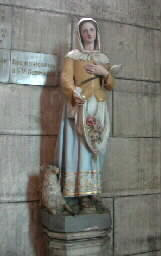
St. Germaine of Pibrac - June 15th
Pibrac is the little village in France where Germaine was born and spent her life. In fact, her right hand was deformed and helpless. Her father paid little attention to her, and her stepmother did not want her around her own healthy children. So Germaine slept with the sheep in the barn, even in cold weather. She dressed in rags and was laughed at by other children. When she came home at night with the flock of sheep she had tended in the fields, her stepmother often screamed at her and beat her.
Yet this poor girl learned to talk with God and to remember that He was with her all the time. She always managed to get to Mass and she received Holy Communion as often as she could. Her sheep she would leave in care of her Guardian Angel, and never once did one wander away from the staff she planted in the ground.
Germaine often gathered young children around her to teach them their faith and fill their hearts with God’s love. She tried her best to help the poor, too. She shared with beggars the little bit of food she was given to eat. One winter day, her stepmother accused her of stealing bread and chased her with a stick. But what fell from Germaine’s apron was not the expected bread. It was summer flowers!
By now people no longer made fun of Germaine. In fact, they loved and admired her. She could have begun to live in her father’s house, but she chose to keep sleeping in the barn. Then, one morning, when she was twenty-two, she was found dead on her straw bed. Her life of great suffering was over and God worked miracles to show that she was a Saint.
The main virtue of this Saint was patience, she carried her big cross well, because she went to Holy Communion often. In our little sufferings, let us turn to Our Lord in Holy Communion and ask His help.
6/14/08
St. Basil the Great
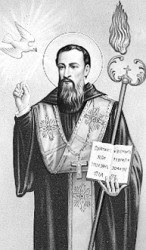
St. Basil the Great - Patron of Hospital Administrators - June 14th
Basil was born in Asia Minor. His grandmother, father, mother, two brothers and a sister are all saints. He was an excellent student and then a teacher, but his sister, St. Macrina, advised him to give up his high place in the world to become a monk. He settled in a wild spot and there founded his first monastery. The rule he gave his monks was so wise that monasteries in the East have followed it down to our own times. Yet Basil himself was called from his monastery to become an archbishop and a great champion of the true Faith against the Arian heretics.
When the Emperor sent one of his officials, a prefect, to make Basil stop preaching against the Arian heresy, he found he could get nowhere with the Saint. “Are you crazy?” the prefect answered. “Are you not afraid of the Emperor’s anger, or exile, or death?” “No,” said St. Basil. “A man who has nothing does not have to be afraid of losing anything. And you cannot exile me, because the whole earth is my home. As for death, it would be a kindness. One blow would end my life and my sufferings together.” The prefect could not believe his ears. “Never before has anyone dared to talk to me like this,” he said. St. Basil answered, “Perhaps you have not had much to do with Christian bishops!”
The Emperor tried three times to write an order for the exile of the Saint, but each time the pen split in his hand.
Basil always found time to help the poor. He grew very angry with selfish people who refused to give to those in need. “You say you do not have enough for yourselves,” he once exclaimed. “Yet while your tongue makes excuses, your hand accuses you. That ring shinning on you finger declares you to be a liar!” He wanted poor people themselves to help those worse off. “Give your last loaf to the beggar at your door,” he urged, “and trust in God’s goodness.”
We will never be ashamed of being devout and showing our Faith with such actions as blessing ourselves every time we pass a Catholic Church.
6/13/08
St. Anthony of Padua
St. Anthony of Padua - Patron of Finding Articles and of the Poor - June 13th
This very popular saint was born in Portugal and the name given him at Baptism was Ferdinand. At the age of fifteen, he entered the Augustinian Order and spent all his time in prayer and study.
When he was twenty-five, he heard about some Franciscans who had been martyred by the Moors in China. From then on, Ferdinand felt a strong desire to die for Christ. He joined the Franciscans, who had been founded only a little while before, and took the name of Anthony. Then he went off to Africa to preach to the Moors. But he soon became so sick that he had to leave. No one in his new Order knew what a brilliant mind he had, because he kept his talents hidden. So he was sent to a lonely hermitage in Italy, and there he washed pots and pans and did other humble chores.
Our Lord, however, wanted St. Anthony to save many souls by preaching. One day, at a gathering of many priests, it was suddenly discovered that there was no preacher! Anthony was told to get up and give the sermon as best he could. How amazed everyone was when he preached a marvelous sermon, full of wise and holy thoughts! From then on, until he died nine years later, St. Anthony preached all over Italy. He was so popular that people even closed their stores to go to hear him. Often the churches could not hold the crowds and then he would preach out in the open. Heretics, criminals, and sinners of every kind were converted.
Anthony was short and rather plump, but he had such virtue and such a love for sinners that just the sight of him was enough to make many repent and confess their sins.
So many miracles have taken place and so many people have obtained favors by praying to him that St. Anthony is famous as the “Wonder-worker.”
The statue of St. Anthony shows him with Baby Jesus. This is because once the Holy Child appeared to the Saint. Other pictures show him holding a Bible because he knew and loved the Word of God very much.
Like St. Anthony, let us love to pray and work unseen. In this way, we shall not become proud, and God will reward every prayer we say and everything we do for love of Him.
6/12/08
St. John of Sahagun
St. John of Sahagun - June 12th
St. John was born in Sahagun, Spain. He received his education from the Benedictine Monks of his town, and then became a parish priest. He could have lived a very comfortable life in the cathedral parish or in other wealthy parishes, but John wanted to imitate Our Lord’s poverty. He chose to keep charge only of a small chapel, where he offered Mass, preached, and taught catechism. He began to be very hard on himself and to practice real poverty.
St. John next went to the great University of Salamanca, because he realized that he that he needed to know theology better. After four years of study, he became famous as a preacher. Nine years later, after a serious but successful operation, he joined a community of Augustinian Friars. There he was outstanding for his obedience and humility. His beautiful sermons brought about a change in the people of Salamanca. They were always quarreling violently among themselves and often the young noblemen fought each other in revenge. St. John succeeded in ending a great many of these bitter fights and persuading people to forgive. He was not afraid to correct evils, even when the sinners were important people who might take revenge. Once he corrected a powerful Duke for the way he was making the poor people suffer. In anger, the Duke sent two men to kill St. John. But when these two saw the Saint, so calm and holy, they were struck with sorrow and asked his pardon. Then the Duke fell sick, and through the prayers of St. John, he repented his sins and even got better.
It was the graces he received from prayer and from the Holy Mass that gave St. John his special power as a preacher. He said Mass so devoutly that sometimes he had the great privilege of seeing Jesus at the moment of the Consecration.
This Saint was so calm and inspiring because he was holy. If we keep our conscience clean, we, too, will have peace and be very happy.
St. John was born in Sahagun, Spain. He received his education from the Benedictine Monks of his town, and then became a parish priest. He could have lived a very comfortable life in the cathedral parish or in other wealthy parishes, but John wanted to imitate Our Lord’s poverty. He chose to keep charge only of a small chapel, where he offered Mass, preached, and taught catechism. He began to be very hard on himself and to practice real poverty.
St. John next went to the great University of Salamanca, because he realized that he that he needed to know theology better. After four years of study, he became famous as a preacher. Nine years later, after a serious but successful operation, he joined a community of Augustinian Friars. There he was outstanding for his obedience and humility. His beautiful sermons brought about a change in the people of Salamanca. They were always quarreling violently among themselves and often the young noblemen fought each other in revenge. St. John succeeded in ending a great many of these bitter fights and persuading people to forgive. He was not afraid to correct evils, even when the sinners were important people who might take revenge. Once he corrected a powerful Duke for the way he was making the poor people suffer. In anger, the Duke sent two men to kill St. John. But when these two saw the Saint, so calm and holy, they were struck with sorrow and asked his pardon. Then the Duke fell sick, and through the prayers of St. John, he repented his sins and even got better.
It was the graces he received from prayer and from the Holy Mass that gave St. John his special power as a preacher. He said Mass so devoutly that sometimes he had the great privilege of seeing Jesus at the moment of the Consecration.
This Saint was so calm and inspiring because he was holy. If we keep our conscience clean, we, too, will have peace and be very happy.
6/11/08
St. Barnabas
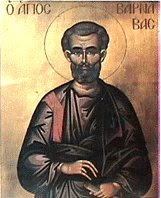
St. Barnabas - Patron of Antioch - June 11th
Even though he was not one of Our Lord’s twelve Apostles, Barnabas is called an apostle by St. Luke because he received a special mission from God. He was a Jew and was born on the island of Cyprus. His name was Joseph, but the Apostles changed it to Barnabas, which means “son of consolation.”
As soon as he became a Christian, St. Barnabas sold all he owned and gave the money to the Apostles. He was a good, kind-hearted man, full of zeal to win souls to Christ. When he was sent to the city of Antioch to govern the new Christians there, he found that there were too many for only one man to guide. Then, because he was very humble, he asked St. Paul to come to share the government of the Church there with him. He was never interested in keeping honor for himself; he only wanted to give glory to God.
Sometime later, the Holy Ghost said through the prophets at Antioch: “Set apart for Me Paul and Barnabas for the work to which I have called them.” Not long afterwards, the two apostles set off on a daring missionary journey. They had many sufferings to bear and often risked their lives, but their preaching won many converts.
Later St. Barnabas went on another missionary journey, this time with his relative, John Mark. They went to St. Barnabas’ own country of Cyprus. So many convert did the Saint win there that he is called the Apostle of Cyprus.
When there is some good to be done, let us do it eagerly and only for God’s greater glory, not for praise.
6/10/08
St. Margaret of Scotland
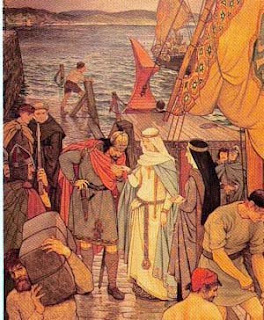
St. Margaret of Scotland - June 10th
Margaret was an English princess. She and her mother sailed to Scotland to escape from the king who had conquered their land. King Malcolm of Scotland welcomed them and fell in love with the beautiful princess. Margaret and Melcolm were married before too long.
As Queen, Margaret changed her husband and the country for the better. Melcolm was good, but he and his court were very rough. When he saw how wise his beloved wife was, he listened to her good advice. She softened his temper and led him to practice greater virtue. She made the court beautiful and civilized. Soon all the princes had better manners, and the ladies copied her purity and devotion. The King and Queen gave wonderful example to everyone by the way they prayed together and fed crowds of poor people with their own hands. They seemed to have only one desire: to make everyone happy and good.
Margaret was a blessing for all the people of Scotland. Before she came, there was great ignorance and many bad habits among them. Margaret worked hard to obtain good teachers, to correct the evil practices, and to have new churches beautiful for God’s glory, and she embroidered the priest’s vestments herself.
God sent this holy Queen six sons and two daughters. She loved them dearly and raised them well. The youngest boy became St. David. But Margaret had sorrows, too. In her last illness, she learned that both husband and son, Edward, had been killed in battle. Yet she prayed: “I thank You, Almighty God, for sending me so great a sorrow to purify me from my sins.”
Let us take this saintly queen for our example. While we do our duties, let us keep in mind the joys that God will give us in Heaven.
6/9/08
St. Columba of Iona
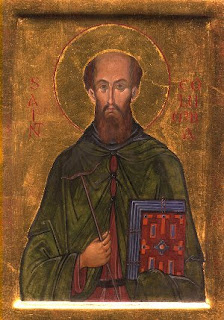
St. Columba of Iona - Patron of Ireland - June 9th
Columba was an Irishman and sometimes he is called by his Irish name of Columkille. He studied at famous monastery schools and became a good poet. Then he became a pupil of St. Finian and later a priest. Before he was twenty-five, he had had the good fortune to study with a number of great Irish saints.
Columba was a tall, strong man with a loud, beautiful voice that people said could be heard a mile away. For fifteen years, he went all over Ireland preaching and starting monasteries. Yet he never stopped studying and he made every effort to obtain many books.
When he was forty-two, St. Columba left Ireland to try to win pagans in Scotland for Christ. On the island of Iona he built a monastery, many missionaries to Scotland and England were to come. St. Columba began his mission to Scotland by going to the castle of the pagan King. The King had commanded his soldiers not to let the Saint enter. But when Columba lifted his arm to make the sign of the cross, the gates fell open by themselves! The King was so amazed that he listened to his words about the Christian Faith and greatly honored St. Columba from then on. Because of the many converts he made, the Saint is called the Apostle of Scotland.
Columba was once a rather rough, quick-tempered man and, though his name means “dove,” he was not gentle at all. But he changed so much that he became loving with everyone, serene and full of holy joy.
The saints were not born saints. They had to overcome their defects. Let us, too, see what our greatest defect is and then pray and work hard to correct it.
6/8/08
St. William of York
St. William of York - June 8th
William Fitzherbert was born in England and was the nephew of King Stephen. As a young man, he was rather easy-going and even a bit lazy. He was very popular with the people of his city of York, however, and years later, when their archbishop died, he was elected to take his place. In those times princes used to interfere in the election of the bishops. This is why many priests did not think William had been properly chosen, since it was his uncle, the King, who had appointed him. Even the great St. Bernard persuaded the Pope to make someone else Archbishop of York. Poor William! Sent away and humiliated, he went to live with his uncle, a bishop, and would not accept any of the comforts his uncle offered him. He was a very different man now.
The people of York were angry at what had happened and there were fights between them and those who did not want William. But the Saint kept praying for peace for six years, and his prayers were answered. When the other archbishop died, the Pope sent William back to York, to the immense happiness of all the people. But he was an old man by this time, and one month later, he died.
St. William silently suffered all the accusations made against him, even though he did not deserve them. This teaches us to take corrections well.
William Fitzherbert was born in England and was the nephew of King Stephen. As a young man, he was rather easy-going and even a bit lazy. He was very popular with the people of his city of York, however, and years later, when their archbishop died, he was elected to take his place. In those times princes used to interfere in the election of the bishops. This is why many priests did not think William had been properly chosen, since it was his uncle, the King, who had appointed him. Even the great St. Bernard persuaded the Pope to make someone else Archbishop of York. Poor William! Sent away and humiliated, he went to live with his uncle, a bishop, and would not accept any of the comforts his uncle offered him. He was a very different man now.
The people of York were angry at what had happened and there were fights between them and those who did not want William. But the Saint kept praying for peace for six years, and his prayers were answered. When the other archbishop died, the Pope sent William back to York, to the immense happiness of all the people. But he was an old man by this time, and one month later, he died.
St. William silently suffered all the accusations made against him, even though he did not deserve them. This teaches us to take corrections well.
6/7/08
Blessed Anne Mary Taigi
Blessed Anne Mary Taigi - June 7th
Anne Mary came from a poor Italian family. Because her father was not a hard-working man, her good mother worked all day long as a servant. To make sure her daughter would grow up to be good, she placed her with the sisters during the day and took her home each evening. She also taught her how to take care of a house and sent her to learn dressmaking. The family grew poorer all the time, and Anne Mary’s mother decided to let her become maid to the rich women for whom her father was working.
Anne Mary was very pretty and she began to admire her own good looks. When she was twenty, she met and married a handsome young servant named Dominic Taigi. He was proud of his pretty wife and the two of them thought only of dressing up and having as much fun as they could. After some months, however, Anne Mary felt unhappy over the way she was living and she made up her mind to change. She began to wear plain clothes and to pray much more.
The Taigis had seven children in their forty-eight years of married life. Their home was poor but always neat and peaceful. Although the Saint’s husband was a rough, stubborn man who easily flew into a rage, Anne Mary was so loving and so good to him that he became a better Christian. She kept her children busy all the time and taught them to be obedient. The whole family prayed together and all were happy, even though sickness, suffering and death often caused them sorrow. Anne Mary was always busy in the simple duties of the house, but she kept herself very close to God all the time. Our Lord even gave her the gift of working miracles and telling the future. And sometimes, right in her kitchen, the love of God would burn so strong in her heart that she would have to lean against the wall until she came out of ecstasy.
Though poor herself, Anne Mary offered what she could to the poor. She gave good advice to the many people who came to her, especially young persons. Even bishops and public leaders asked her advice, because they knew she was very dear to God.
Let us say our morning and night prayers every day. During the day, let us do well everything we do, and offer it up to Jesus. In this way we, too, will become saints in whatever life God plans for us.
Anne Mary came from a poor Italian family. Because her father was not a hard-working man, her good mother worked all day long as a servant. To make sure her daughter would grow up to be good, she placed her with the sisters during the day and took her home each evening. She also taught her how to take care of a house and sent her to learn dressmaking. The family grew poorer all the time, and Anne Mary’s mother decided to let her become maid to the rich women for whom her father was working.
Anne Mary was very pretty and she began to admire her own good looks. When she was twenty, she met and married a handsome young servant named Dominic Taigi. He was proud of his pretty wife and the two of them thought only of dressing up and having as much fun as they could. After some months, however, Anne Mary felt unhappy over the way she was living and she made up her mind to change. She began to wear plain clothes and to pray much more.
The Taigis had seven children in their forty-eight years of married life. Their home was poor but always neat and peaceful. Although the Saint’s husband was a rough, stubborn man who easily flew into a rage, Anne Mary was so loving and so good to him that he became a better Christian. She kept her children busy all the time and taught them to be obedient. The whole family prayed together and all were happy, even though sickness, suffering and death often caused them sorrow. Anne Mary was always busy in the simple duties of the house, but she kept herself very close to God all the time. Our Lord even gave her the gift of working miracles and telling the future. And sometimes, right in her kitchen, the love of God would burn so strong in her heart that she would have to lean against the wall until she came out of ecstasy.
Though poor herself, Anne Mary offered what she could to the poor. She gave good advice to the many people who came to her, especially young persons. Even bishops and public leaders asked her advice, because they knew she was very dear to God.
Let us say our morning and night prayers every day. During the day, let us do well everything we do, and offer it up to Jesus. In this way we, too, will become saints in whatever life God plans for us.
6/6/08
St. Norbert
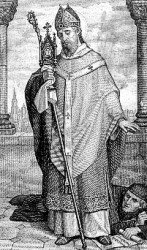
St. Norbert - June 6th
Norbert was a German who was good while a boy and young man. Then at the court of the Emperor, Henry V, he spent nearly all his time in the pleasures of the world, and he thought only of honors, feasts and parties. One day, however, frightened by a flash of lightning, his horse threw him and he was knocked unconscious. When he came to his senses, he was touched by the grace of God, and he made up his mind to lead a better life. Moreover he went back to the idea he once had had-to become a priest, and he did.
Then he worked hard to make others turn from their worldly ways and gave good example by selling all he had to give the money to the poor. St. Norbert also became the founder of a new Congregation for the spreading of the Faith.
Later, he was chosen bishop of the city of Magdeburg. He entered the city wearing very poor clothes and no shoes. The porter at the door of the bishop’s house did not know him and refused to let him in. He told him to go join the other beggars! “But he is our bishop!” shouted those who knew the Saint. The porter was amazed and very sorry. “Never mind, dear brother,’ said St. Norbert kindly, “you judge me more correctly than those who brought me here.”
St. Norbert had to combat a heresy which denied that Jesus is really present in the Holy Eucharist. His beautiful words about Our Lord’s presence in the Blessed Sacrament brought the people back to their holy Faith.
Let us go to receive Jesus in Holy Communion often-at least once a week. If we feel little love for the things of God, Jesus will make us warm with devotion. If we feel weak in spirit, He will make us strong. If we feel sad, he will console us.
6/5/08
St. Boniface
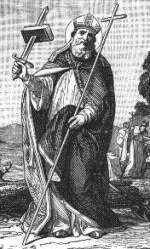
St. Boniface - Patron of Germany - June 5th
This great Apostle of Germany was an English man. When he was a small boy, some missionaries who were staying at his home talked to him about their work and filled him with a great desire to become like them. While still very young, he entered a monastery school and some years later he himself became a very popular teacher. When he was ordained a priest, he gave many sermons taken from the Bible, which he dearly loved to read.
Boniface daily grew in love for God and for souls. So, with his Superior’s permission, he became a missionary to Germany, which at that time covered a large part of Europe. With the blessing of Pope St. Gregory, he preached with wonderful success.
Boniface was a man of great courage. Once, to prove that the pagan gods were false, he did a bold thing. There was a certain huge oak tree that the pagans thought was sacred to their gods. In front of a large crowd, Boniface struck it a few times with an axe. The big tree crashed, and split into four parts. The pagans saw that their gods were false when nothing happened to the Saint for this act.
Everywhere Boniface preached, new members came into the church. In his lifetime, he converted millions. In place of the statues of the gods, he built churches and monasteries.
When he was seventy-three, St. Boniface left someone else in charge of his work, and sailed with some companions to preach to more pagans. Here, too, he was successful and he baptized large numbers. Then, one day, as he was about to give some converts the Sacrament of Confirmation, he was martyred. A group of fierce pagans swooped down on their camp, and the Saint would not let his companions defend him. "Our Lord tells us to repay evil with good,” he said. "The day has come for which I have waited so long. Trust in God, and He will save our souls.” The barbarians attacked, and Boniface was the first one they killed.
Even today there are millions of souls who do not know the true god. Let us pray for them, and if God inspires us to become missionaries, let us be generous and courageous enough to follow His call.
6/4/08
St. Francis Caracciolo
St. Francis Caracciolo - June 4th
This Italian Saint lived like other young noblemen, even though he was a devout Christian and very charitable. He loved all sports, but his favorite was hunting. Then when he was twenty-two, a disease something like leprosy brought him very close to death. While he was sick, he thought about the emptiness of the pleasures of the world and the happiness of those who serve God alone. So he made a vow that if he got better, he would dedicate his life to God. The disease left him so fast that it seemed a miracle, and the young man began his studies to become a priest.
Later, the new priest joined a group who were devoted to caring for prisoners and preparing condemned criminals to die a good death. But his great mission was began when he and another priest, John Augustine Adorno, started the Congregation of Minor Clerks Regular.
When John Adorno died, Francis was chosen superior, even though he did not want the honor. So humble was he that he used to sign his letters, “Francis the sinner.” And he took his turn, like the other priest, in sweeping floors, making beds, and washing dishes. He often spent almost the whole night praying in church, and he wanted all the priest to spend at least one hour a day in prayer before the Blessed Sacrament.
St. Francis spoke so often and so well about God’s love for us that he was called, “Preacher of the Love of God.” he carefully guarded his purity and converted some evil women who tried to make him sin. Always he practiced mortifications of every kind.
Just before he died, St. Francis suddenly cried, “Let’s go!” “Where do you want to go?” asked the priest by his bed. “To Heaven! To Heaven!” came the answer in a clear, happy voice. And right afterwards, the Saint died.
Good times are not enough to fill our hearts. Let us use some of our free time doing something worthwhile so that our life, too, may be useful.
This Italian Saint lived like other young noblemen, even though he was a devout Christian and very charitable. He loved all sports, but his favorite was hunting. Then when he was twenty-two, a disease something like leprosy brought him very close to death. While he was sick, he thought about the emptiness of the pleasures of the world and the happiness of those who serve God alone. So he made a vow that if he got better, he would dedicate his life to God. The disease left him so fast that it seemed a miracle, and the young man began his studies to become a priest.
Later, the new priest joined a group who were devoted to caring for prisoners and preparing condemned criminals to die a good death. But his great mission was began when he and another priest, John Augustine Adorno, started the Congregation of Minor Clerks Regular.
When John Adorno died, Francis was chosen superior, even though he did not want the honor. So humble was he that he used to sign his letters, “Francis the sinner.” And he took his turn, like the other priest, in sweeping floors, making beds, and washing dishes. He often spent almost the whole night praying in church, and he wanted all the priest to spend at least one hour a day in prayer before the Blessed Sacrament.
St. Francis spoke so often and so well about God’s love for us that he was called, “Preacher of the Love of God.” he carefully guarded his purity and converted some evil women who tried to make him sin. Always he practiced mortifications of every kind.
Just before he died, St. Francis suddenly cried, “Let’s go!” “Where do you want to go?” asked the priest by his bed. “To Heaven! To Heaven!” came the answer in a clear, happy voice. And right afterwards, the Saint died.
Good times are not enough to fill our hearts. Let us use some of our free time doing something worthwhile so that our life, too, may be useful.
6/3/08
St. Clotilda
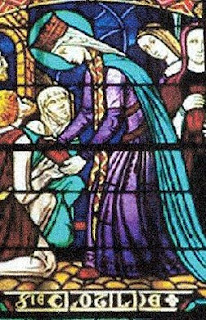
St. Clotilda - June 3rd
Clotilda was the daughter of the King of Burgundy. After her father’s death, her uncle became King, and the princess was brought up in his court. Although this court was full of dangers to her soul, she did not let the attractions of pleasures make her sin. When the pagan King of the Franks, Clovis, asked for her as his wife, her uncle gave permission, but said she must be allowed to practice her Christian Faith.
King Clovis of France was a hot-tempered barbarian, but his Queen Clotilda soon won his heart with her beauty, sweetness, and charming ways. Although she spent many hours in prayer and secretly practiced penance, she dressed and acted as a Queen should, to please her husband. The great desire of her heart was to see him become a Christian.
One day, as he was going to battle, she told him to pray to the God of the Christians. During the battle, King Clovis’ soldiers began to go over to the enemy. He saw that he would surely lose, and he vowed that if Clotilda’s God would make him victorious, he would become a Christian. He won the battle, and on Christmas Day, Clovis and over three thousand Franks were baptized. It is easy to see why St. Clotilda is called the Apostle of France.
After her husband’s death, she had to suffer much from the fighting of her sons, and she tried in every way to keep peace among them. When she was dying, she begged them to treat their subjects well, to protect the poor, and to live in peace. Then she turned all her thoughts to God and prepared herself for death by praying with great devotion.
In the midst of many dangers and in the company of very rough people, Clotilda became a saint. We, too, can become saints if we try to imitate her by praying and being kind all the time.
6/2/08
St. Pothinus and the Martyrs of Lyons
St. Pothinus and the Martyrs of Lyons - June 2nd
Lyons is a city in France, and back in the very early days of the Church, there was a great persecution of the Christians in that region. As it grew worse, some weak Christians were so afraid of being tortured that they gave up their Faith. But the braver ones, who trusted in God, soon won back their weaker brothers, and all together, they suffered for Jesus.
Some were burned with red-hot plates; some were thrown to beasts; some were whipped; and some were roasted in an iron chair. A slave girl named Blandina amazed her persecutors by her courage. She was tortured all day long, but in the end, it was her torturers who gave up, not she. On the last day of the martyrdoms, Blandina was brought out before all the people to suffer again. Yet she looked as happy as if she were going to her wedding! In fact, she was so intent on talking in her heart to Jesus that she did not even feel it when she was tossed over and over again by a bull! When she was killed, the pagans themselves said they had never seen a women show such courage.
The leader of all these martyrs was the bishop of Lyons. St. Pothinus. He was ninety years old. They kicked and beat him so much that he died two day later in prison.
Let us always be thankful that we share in the divine Faith as these strong Christians. May we never be ashamed of being followers of Christ.
Lyons is a city in France, and back in the very early days of the Church, there was a great persecution of the Christians in that region. As it grew worse, some weak Christians were so afraid of being tortured that they gave up their Faith. But the braver ones, who trusted in God, soon won back their weaker brothers, and all together, they suffered for Jesus.
Some were burned with red-hot plates; some were thrown to beasts; some were whipped; and some were roasted in an iron chair. A slave girl named Blandina amazed her persecutors by her courage. She was tortured all day long, but in the end, it was her torturers who gave up, not she. On the last day of the martyrdoms, Blandina was brought out before all the people to suffer again. Yet she looked as happy as if she were going to her wedding! In fact, she was so intent on talking in her heart to Jesus that she did not even feel it when she was tossed over and over again by a bull! When she was killed, the pagans themselves said they had never seen a women show such courage.
The leader of all these martyrs was the bishop of Lyons. St. Pothinus. He was ninety years old. They kicked and beat him so much that he died two day later in prison.
Let us always be thankful that we share in the divine Faith as these strong Christians. May we never be ashamed of being followers of Christ.
6/1/08
St. Pamphilus
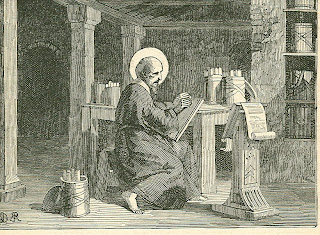
St. Pamphilus - June 1st
Pamphilus was born in Lebanon and became a famous scholar in his own city. He studied in Egypt and then settled down in Palestine. Here he became a priest and started a school for the study of the Holy Bible.
Pamphilus loved to read and to study religious writings. He collected a wonderful library of them, which was preserved for a long time after he died. He was so anxious to have many people read God’s message in the Bible that he would give away his copies of the holy Book. In those days, when there were no printing presses, books cost a great deal of money, because they had to be copied all by hand. Yet St. Pamphilus was so generous that he gave many away.
This Saint treated everyone, even the poor slaves, as his brothers. He gave all the money he received from his father to his relatives and friends and to poor people. After working hard all his life, he was put in prison for refusing to worship false gods. He kept on writing the two years he was in prison. Then he and other faithful Christians were beheaded and so won the martyr’s crown.
Little by little, let us build up on an inspiring home library. Then let us make use of it. We will be surprised at how good we feel when we read books on our holy Faith!
Subscribe to:
Posts (Atom)
